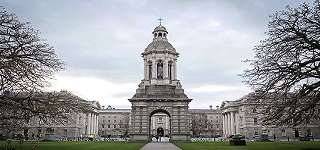
'Cycling for the Ages': the Velo-city 2019 Dublin theme explained
 Dublin is a historic city with a unique coastal landscape and just like the sea and the tides, cycling and the cycling environment are constantly changing. Velo-city 2019 Dublin’s conference title is ‘Cycling for the Ages’, a theme that is open to as wide or as narrow an interpretation as the author, expert, activist chooses to attribute to it.
Dublin is a historic city with a unique coastal landscape and just like the sea and the tides, cycling and the cycling environment are constantly changing. Velo-city 2019 Dublin’s conference title is ‘Cycling for the Ages’, a theme that is open to as wide or as narrow an interpretation as the author, expert, activist chooses to attribute to it.
‘Cycling for the Ages’ refers to the ages of the existing and potential cyclists, and how we can make cycling an intergenerational mode of transport accessible to truly everyone. Everyone precisely meaning encouraging cycling from young to old, female to male, urban to rural resident, commuter to leisure cyclist and the list goes on.
‘Cycling for the Ages’ refers to the ages of our socio-economic systems and structures, from the past to the future, from now to the next milestone we collectively define. It alludes to the changes underway or to come, which affect cycling now and in the future. How do we create our cycling future accounting for technological advances in the transport and data world, while maintaining a link to the localized past of more human-oriented approaches? How do we address climate change and environmental degradation as a true global overarching threat while using our existing urban structures? How do we truly make cycling a viable solution to our modern and ever-increasing crises?
In today's interconnected and inexorably linked global society and economy, nothing can happen or be achieved in isolation. The overlapping sub-themes of Velo-city 2019 Dublin, are not only meant to enable an integrated and comprehensive approach to cycling but to demonstrate that a way forward which establishes 'Cycling for the Ages', requires a systems perspective. It requires taking into consideration the promise of technological advances, the acknowledgement of the human factor and its role in such advances and the greater structures which support both in terms of environment and infrastructure currently in place. Our sub-themes are as follows:
Technology, Intelligent Transport Systems and Data Analytics: how can the cycling environment be changed by using the wealth of data stemming from cycling apps, the untapped potential of cycling in climate change and emissions alleviation and the role of cycling in combating a variety of health problems through naturally building exercise into our daily routines? And we will welcome thought-provoking and challenging ideas about these changes as part of the conference, such as autonomous vehicles – end of cycling or danger to cyclists?
- Health and Social: The theme of Health & Social is about people and how cycling can work to improve the health and social aspects of daily life. No two people are the same and people have a myriad of different needs and wants when it comes to movement. These needs change and evolve as we grow, age and develop through life. Cycling can greatly enhance and improve the individual lives of people in our communities and cities. Cycling is good for our health, our happiness and wellbeing and for our communities and cities. Cycling forms part of the solution to many urban problems.
- Environment and Infrastructure: From the Rio Declaration in 1992 to the Paris Agreement in 2015, there is a global acknowledgement that nations and city regions must act to reduce emissions and protect the environment. Velo-city 2019 provides an opportunity to challenge current transportation mobility practices and inspire positive attitudes to cleaner environments through sustainable mobility. Cycling infrastructure, its legibility and how it is used has generated wide ranging debates covering topics such as resilient infrastructure, shared space, segregation, cycling streets and quiet ways.
The conference vision is ‘The cycling city of 2030’ and how that city should look and what we do to achieve this desired vision? So if we know the cycling vision that we want or maybe don’t want in 2030, then we can use this vision to work backwards and view the steps that are being discussed now through the lens of what we want to have in place in 2030. Backcasting our future with a view in the present and the past can pave a realistic and shared way forward. One vision of the city of 2030 is where cycling for all is accommodated, from young to old, male and female, different social classes or backgrounds, and so on. In this vision cycling would be seen as an integrated mode of transport that is closely combined with other modes to achieve seamless multi-modal travel and where cycling is seen as a safe, desirable and available for everyone.
More info at www.velo-city2019.com.
Regions:
Network/Project Involved:
Contact the author
Recent news!
Upcoming events
Contact Us
Avenue des Arts, 7-8
Postal address: Rue de la Charité, 22
1210 Brussels, Belgium









